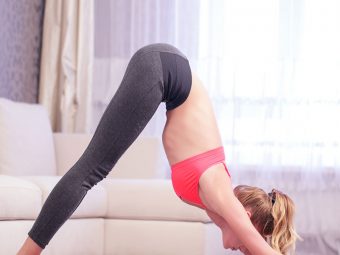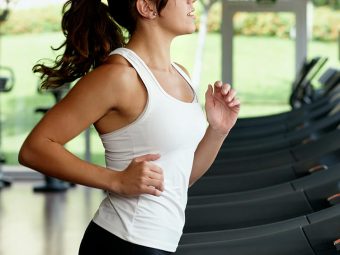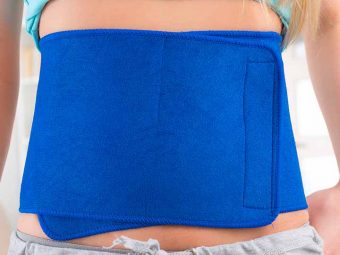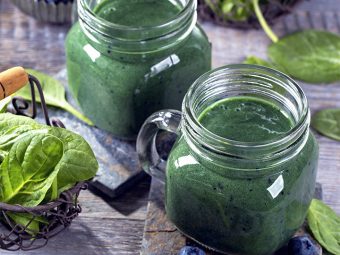Swimming Weight-Loss Workouts Guided By Experts And Their Benefits
Yes! You can cool off, burn calories, and tone your muscles at the same time.
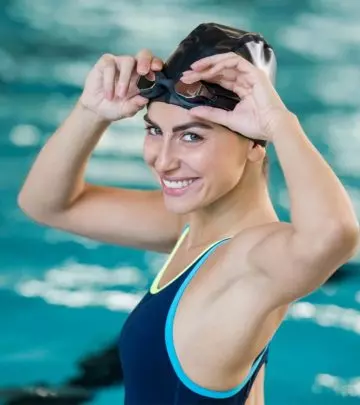
Image: Shutterstock
Is sweating at the gym not your thing? Add an element of fun to your workout with swimming! “Swimming is an excellent way to train your body because it is both a cardiovascular workout and a resistance one (1). Pushing your body through the water takes a lot of strength. It’s a great resource for those who want to help build their heart health and trim a few pounds while they do it,” says certified personal trainer, Jack Craig. NASM and ACE-certified personal trainer and author, Erin Mahoney explains, “The more weight you have to lose, the more uncomfortable most forms of cardio usually are. This isn’t the case with swimming.”
This post is a beginner’s guide to swimming, with an expert-recommended workout plan for weight loss and the list of benefits of becoming a swimmer! Read on to get the details. Swipe up!
In This Article
Why Is Swimming Good?
Swimming is a fat-burning, low-impact full-body workout. This is precisely why it is best for weight loss, fitness, flexibility, coordination, and reducing stress (2), (3), (4), (5).
“Exercises like running or jumping are not only high impact. If you have any type of muscle imbalances from the core down, that high impact is incrementally worse on your body. So the harder you try (or faster you go) in running or jumping, the more you set yourself up for pain and injury. For swimming, there’s no impact,” says Mahoney. “Further, because it’s a horizontal exercise, you don’t have a downward gravitational pull that impacts lower body mechanics. So, it’s easier on the body and burns a lot of calories since it’s total-body,” she adds.
NASM-certified personal trainer, John Gardner assures that “swimming is an excellent form of aerobic activity that helps in generating the benefits of physical activity while still being easy on the joints. It can help promote weight loss, build muscle, prevent injuries, and relieve back pain.” Dinesh Kumar Reddy, a certified fitness trainer and competitive bodybuilder, lists out the benefits of taking up this water sport for building endurance, and burning calories:
1. Entire Body Workout
If you want to work your whole body, then the best workout to go for is 150 minutes of swimming with moderate intensity or 75 minutes of high-intensity swimming. Swimming works your entire body, from head to toe, all at once. The water acts as natural resistance, which can help increase muscle mass.
2. Easy On The Joints
Swimming does not involve any impact on the ground, which means your knees don’t have to cope with added force from the impact (2).
3. Improves Balance
Swimming will improve your balance as there is no support, and yet you have to make movements, twists, and turns through the water (2), (6).
4. Enhances Mind-Body Coordination
The lack of support and utilization of your limbs demands extraordinary mind-body coordination. This can also increase your eye-hand coordination and balance (6). It can be a relaxing and enjoyable way to exercise, which can help keep you motivated and consistent with your workouts.
5. Reduces Stress
Swimming favors the production of the neurotransmitter dopamine, which is responsible for regulating moods (4), (7).
6. Prevents Diseases
When you swim, you help prevent diseases such as osteoporosis, which affects the bones in women over 45 years old (8). Swimming may help boost your immune system and your metabolism, which will allow your body to continue to burn calories even after your swim session is over.
7. Improves Heart health
One of the main advantages of swimming, which is true for all aerobic sports, is that it strengthens your heart function and improves your circulatory system (9).
It goes without saying that swimming is one of the best forms of exercise. But can it also help you lose belly fat? Scroll down to find out.
Can Swimming Help You Lose Belly Fat?
“Since there’s no way to spot-reduce fat like belly fat, you won’t be able to target problem areas with swimming alone. However, it’s an incredibly efficient workout that can help you burn calories fast,” says Craig. “However, it works on losing fat across the entire body, not just belly fat. But, because you use your core muscles during swimming, it can speed up the process of fat burning and help you lose belly fat faster than performing ab exercises, for example,” reasons Gardner.
 Quick Tip
Quick TipIn other words, you will lose full body fat and improve lean muscle mass, so losing belly fat is a given. Take a look at the following swimming workout routine for weight loss by experts.
Expert-Designed Swimming Workout For Weight Loss
The following three workout routines are created by CISSN and ISSA-certified Isaac Robertson, NASM-certified John Gardner, and Dinesh Kumar Reddy, a certified fitness trainer and competitive bodybuilder.
Swimming Workout 1
- Warm-up – Start with a simple warm-up before you get into the pool. Stretch for a couple of minutes and continue the warm-up after getting into the pool by carrying out simple kicks for 10-15 minutes.
- Swim across the length of the pool 2-3 times, then rest. Repeat this 3 times. Swimming hard and fast will increase your stamina.
- Breaststrokes for 23 miles – Repeat 3 times and rest for 10 seconds in between.
- Flutter kicks for 20 miles – Repeat 4 times with 10-second rests in between.
- Back strokes for 25 miles – 3 reps with 20-second rests in between.
- Swim slowly for 40 miles and rest for 5 minutes.
- End the workout with accelerated swimming for 20 minutes.
Swimming Workout 2
- Warm-up – Swim at a moderate pace for 200 m
- Pre-set – Freestyle for 200 m and kick for 100 m. Do this 2 times.
- Do 3 sets of the following and rest for 1 minute between sets.
- Minute 1: Front crawl at a high speed for 50 seconds. Rest for 10 seconds.
- Minute 2: Backstroke at a high speed for 50 seconds. Rest for 10 seconds.
- Minute 3: Forward kicks only at maximum speed for 50 seconds. Rest for 10 seconds.
- Minute 4: Backstroke (arms only, keep legs straight) at a maximum speed for 50 seconds. Rest for 10 seconds.
- Minute 5: Breaststroke at a high speed for 50 seconds. Rest for 10 seconds.
- Cool down – Swim at a very slow pace to reduce your heart rate and relax your muscles for 200 m.
Swimming Workout 3
Moderate Intensity
- Warm-Up – Begin by walking the length of the pool, first outside of the water and then waist-deep in water to warm up the legs.
- 6 x 50 yards flutter kick on board with 20 seconds rest in between swimming laps.
- 3 x 100 yards alternating freestyle (odds) and backstroke (evens) with 30-second rests in between laps.
- 6 x 50 yards alternating sprint kick (odds) and easy kick (odds) with 15-second rests in between laps.
- 1 minute rest.
- 6 x 50 yards freestyle with 20-second rests in between laps.
- 3 x 100 yards freestyle with 30-second rests in between laps.
- 6 x 50 yards alternating sprint freestyle (odds) and easy backstroke (evens) with 15 seconds rest in between laps.
High Intensity
- Warm-up with 300 yards freestyle swimming, 200 yards pull with a buoy, and 100 yards kicks with the board.
- 4 x 50 yards freestyle with 10 seconds rest in between laps
- 4 x 100 yards counting your strokes per length with 20 seconds rest in between laps (aim to take one fewer stroke each round).
- 4 x 50 yards kick with a board with 15 seconds rest in between laps.
- 8 x 50 yards alternating sprint freestyle (odds) and sprint stroke count (evens) with 10 seconds rest in between laps.
- Cool down with 200 yards freestyle easy.
 Quick Tip
Quick TipFollow any of the above routines that suit you best. Start slow and then move on to high-intensity swimming workouts. You will be able to burn a good amount of calories in a day, which will help you shed a lot of pounds by the end of a month. Exactly how many calories will you burn? Scroll down to find out.
How Many Calories Can You Burn By Swimming?
“Swimming burns about 423 calories in a person weighing 160 pounds in an hour, and approximately 500 to 900 calories in a person weighing 200 pounds,” says Reddy. Therefore, you can burn anywhere between 1600 and 3600 calories if you swim 4 days a week. The burned calories help achieve a weight loss of approximately 2-4 pounds a month (1 pound fat = 3500 calories) (10).
Finally, here is a list of precautions and tips before you start swimming to whittle away the fat. Take a look.
Tips And Precautions To Take
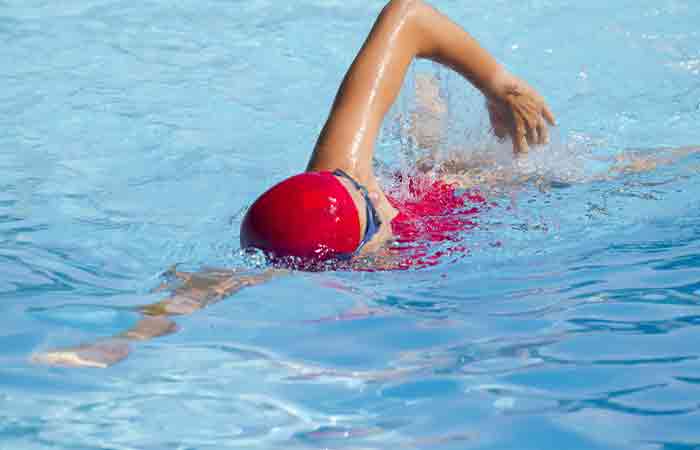
- If you are a beginner, do a supervised swimming workout.
- Learn the correct breathing techniques.
- Get used to being in the water and moving freely, then go for swim training or workouts.
- Consider lessons or start with a kickboard or fins to make it easier at first.
- Avoid drinking too much water during and before swimming.
- Wear goggles and a cap to protect your eyes and hair from chlorine.
- Try to do a pool workout when the area is less crowded.
- Add progressions like hand paddles or swimming in a shirt to increase the water resistance.
- Invest in a waterproof activity tracker (smartwatch) to time your intervals, monitor your heart rate, and track your calories.
- Take a break if you are feeling tired or run down.
- Make sure you are not confused between swimming strokes like the butterfly stroke or freestyle.
- Never push yourself so far that you become exhausted or begin vomiting.
In the next section, let us burst some myths about swimming. Scroll down to learn the truth.
Myths About Swimming
- Swimming Doesn’t Lead To Weight Loss
Some believe swimming isn’t effective for weight loss, but it’s not that simple. Elite swimmers are lean and muscular because swimming burns calories. A 30-minute slow swim can burn more calories than a walk for the same duration. You can burn even more with swim intervals—like 10 sets of 100 yards with short rests.
- Wait An Hour After Eating To Swim
For ages, people said you should wait an hour after a meal before you swim, fearing cramps. But that’s a myth. Your body knows how to manage digestion while exercising. If you’ve eaten a big meal, your workout might be slightly slower, but there’s no need to wait an hour after eating to take a swim.
Sean Kernan, a blogger, talks about how he lost weight and managed his back pain by swimming. He writes, “I’d lost a full 30 lbs. My double chin vanished and my jawline appeared. All the soreness was gone and I felt new muscles in my chest and other parts that I didn’t know were there (i).”
The Final Takeaway
Swimming is an enjoyable activity that is also a great form of exercise for weight loss as it is low impact and can be performed by individuals of all fitness levels. This aquatic exercise is a great way to support weight management and lead a healthy lifestyle. It improves not only your body aesthetics but also your cardiovascular and mental health. It is easy on the joints, adds the right amount of resistance without straining the bones, and is even therapeutic on various levels. Additionally, you can try aquatic therapy (or hydrotherapy) to burn more calories if you love water-based exercises. Talk to a swimming instructor before you join a class if you are a beginner. Get your swimming gear ready and enjoy burning fat without sweating!
Frequently Asked Questions
Does swimming change body shape?
Swimming can help tone your body. The improved muscle tone may increase muscle mass and fat loss.
Is swimming better than the gym?
It depends on your goal. If you want to improve your cardiovascular health, agility, and mobility, then swimming is a better choice than going to the gym. But, the gym is great if you want to focus on strength and resistance training.
Is swimming better than walking?
You burn more calories swimming than you would walking for the same amount of time. Swimming also works on your entire body as it engages your arms, legs, and core.
Is it unhealthy to swim every day?
No. Swimming is a great exercise to practice every day. It keeps you in shape and active. It can help improve body composition. However, you should take the necessary precautions (like using waterproof sunscreen) to make sure you are not exposed to the sun for too long.
Key Takeaways
- Swimming promotes weight loss, a healthy heart, and calorie burning.
- The increased production of dopamine during swimming is beneficial for reducing stress and improving one’s overall mood.
- It is an excellent physical and aerobic exercise as it increases and improves muscle strength and balance
- Follow swim workouts only after learning proper breathing techniques and becoming a comfortable swimmer.
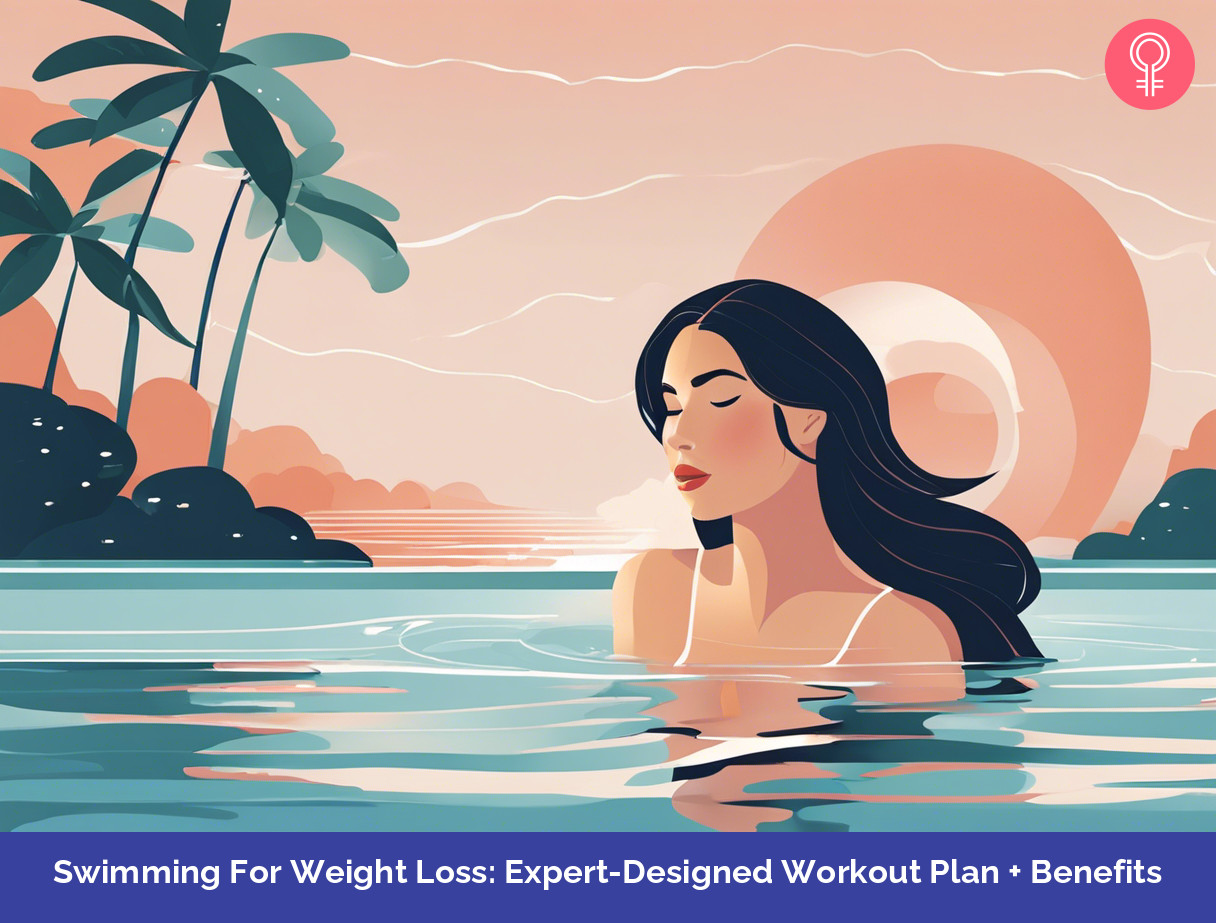
Image: Stable Diffusion/StyleCraze Design Team
Learn how swimming can help you shed those stubborn pounds with these easy tips. Check this video to start your journey to a healthier you!
Personal Experience: Source
StyleCraze's articles are interwoven with authentic personal narratives that provide depth and resonance to our content. Below are the sources of the personal accounts referenced in this article.
i. I Swam One Mile A Day For 90 Days Straight. It Changed My Life.https://medium.com/mind-cafe/i-swam-one-mile-a-day-for-90-days-straight-it-changed-my-life-f9ecfd86e915
References
Articles on StyleCraze are backed by verified information from peer-reviewed and academic research papers, reputed organizations, research institutions, and medical associations to ensure accuracy and relevance. Read our editorial policy to learn more.
- Swimming physiology
https://pubmed.ncbi.nlm.nih.gov/1642724/ - Effect of regular swimming exercise on the physical composition strength and blood lipid of middle-aged women
https://www.ncbi.nlm.nih.gov/labs/pmc/articles/PMC4625655/ - A comparison of the effects of swimming and walking on body weight fat distribution lipids glucose and insulin in older women–the Sedentary Women Exercise Adherence Trial 2
https://www.researchgate.net/publication/41669017_A_comparison_of_the_effects_of_swimming_and_walking_on_body_weight_fat_distribution_lipids_glucose_and_insulin_in_older_women–the_Sedentary_Women_Exercise_Adherence_Trial_2 - Effects of Swimming Training on Stress Levels of the Students Aged 11-13.
https://eric.ed.gov/?id=EJ1110780 - EFFECTS OF SWIMMING TOWARDS MENTAL HEALTH IN COLLEGIATE MALE ADULTS
https://www.researchgate.net/publication/339165057_EFFECTS_OF_SWIMMING_TOWARDS_MENTAL_HEALTH_IN_COLLEGIATE_MALE_ADULTS - Effects of swimming on eye hand coordination and balance in the elderly
https://pubmed.ncbi.nlm.nih.gov/20922347/ - The Effect of Swimming on Anxiety-Like Behaviors and Corticosterone in Stressed and Unstressed Rats
https://www.ncbi.nlm.nih.gov/labs/pmc/articles/PMC7558513/ - Swimming as Treatment for Osteoporosis: A Systematic Review and Meta-analysis
https://www.ncbi.nlm.nih.gov/labs/pmc/articles/PMC7245678/ - Swimming and the heart
https://pubmed.ncbi.nlm.nih.gov/23602872/ - What is the Required Energy Deficit per unit Weight Loss?
https://www.ncbi.nlm.nih.gov/labs/pmc/articles/PMC2376744/












